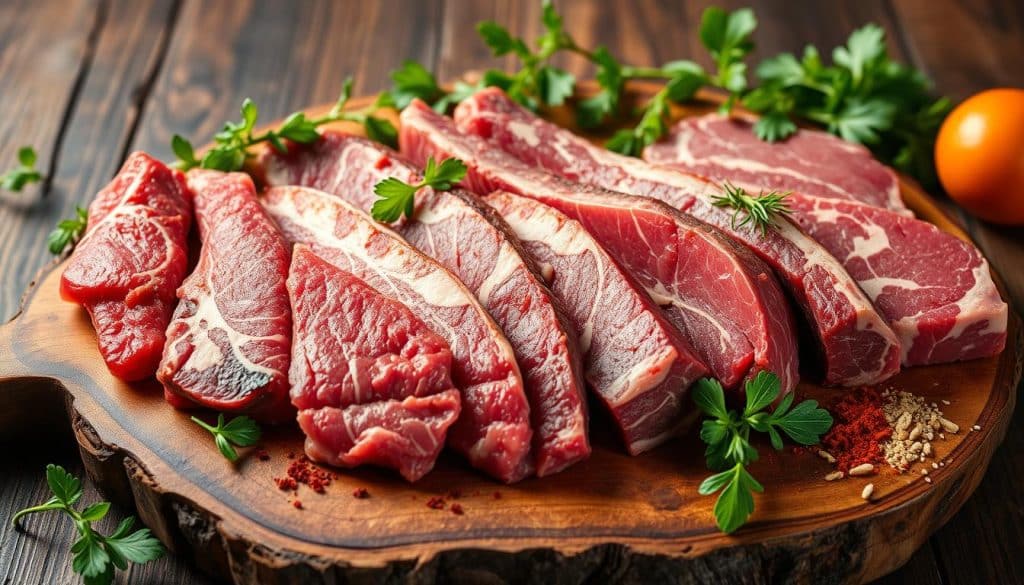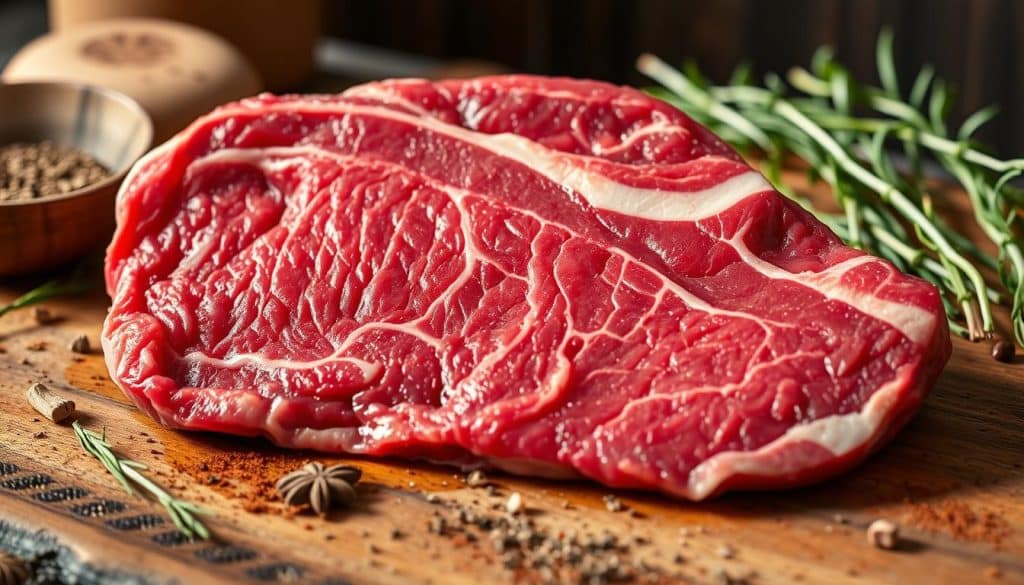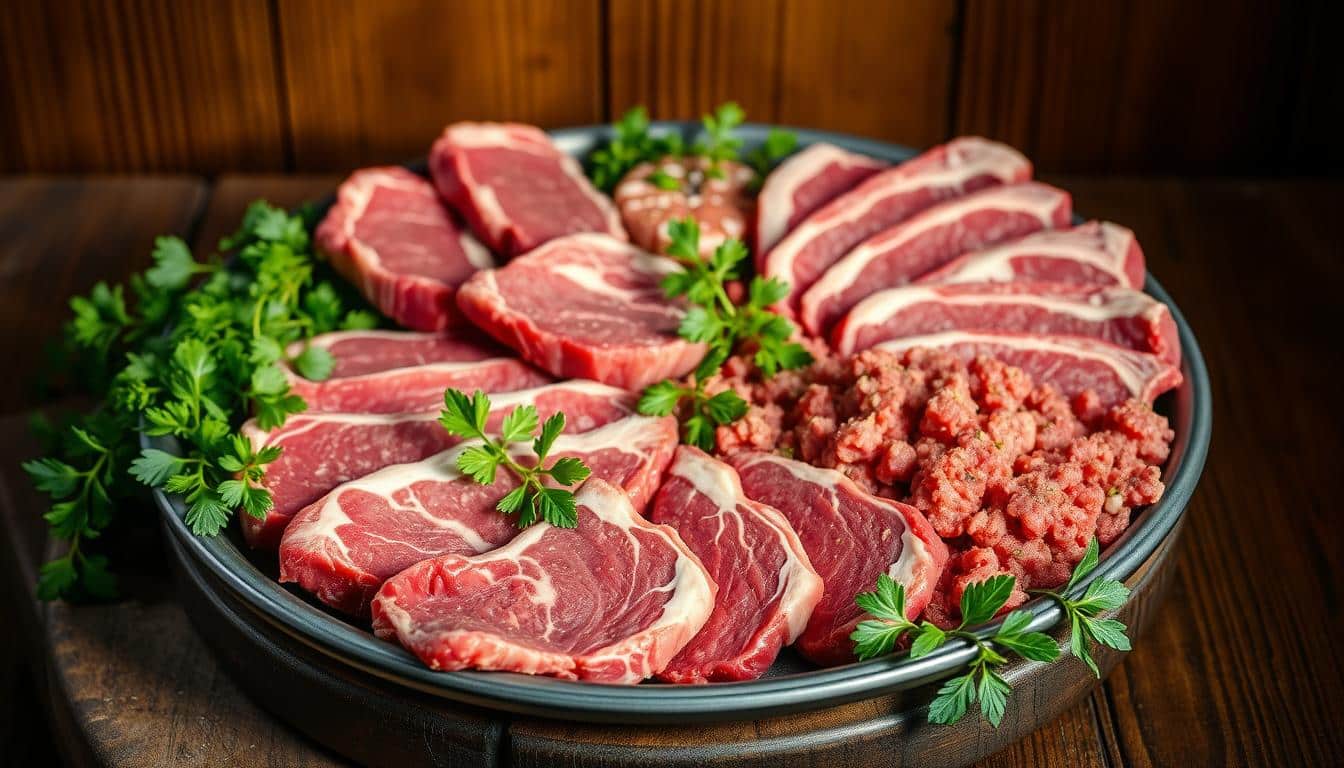When you buy meat, you have many choices, including halal beef. You might want a halal beef supplier that offers certified halal beef. With more people wanting halal beef, knowing the difference between certified and regular beef is key.
Choosing certified halal beef means you get quality meat that fits your diet. Learning about what makes beef halal and the certification process helps you make better choices.
- Halal beef meat is a popular choice for many consumers
- Certified halal beef ensures high-quality meat that meets dietary requirements
- Understanding the certification process is important for making informed decisions
- Halal beef supplier options are available for those looking for certified halal beef
- Certified halal beef is a great option for those seeking a reliable and trustworthy meat source
- Halal beef meat is a significant consideration for consumers in the United States
Understanding Halal Beef Meat and Its Significance
Buying halal beef meat is important. It’s easier now to find high-quality, certified halal beef online and through delivery. But, what is halal beef, and why is it significant?
Halal certification ensures beef meets certain standards. This includes how the animal is raised and slaughtered. Choosing halal beef means you get meat that’s of high quality and clean. It’s also seen as a healthier choice because of strict production rules.
What Makes Beef Halal
Beef is halal if it comes from an animal slaughtered the right way. This means using a sharp knife and saying Allah’s name during slaughter. The animal must also be healthy and without defects.
Religious Requirements for Halal Certification
The rules for halal certification come from Islamic law. The certification checks if the beef meets these standards. It ensures the animal was slaughtered correctly and the meat was handled properly.
Health Benefits of Halal Beef
Halal beef is healthier because of strict production rules. It doesn’t have antibiotics or hormones, making it more natural. The slaughter process is also designed to be humane, making the meat tender and flavorful.

Knowing about halal beef and its certification helps you make better choices. With online and delivery options, finding quality halal beef is easier than ever.
The Halal Certification Process for Beef
When you buy halal beef, knowing the certification process is key. A good halal beef supplier ensures the beef is top quality and authentic. The process starts at the farm, where cattle are raised following halal rules.
The steps include:
- Checking the farm and cattle to see if they follow halal standards
- Verifying the slaughter process to make sure it’s halal
- Examining meat processing and handling to avoid contamination
- Getting certified by a trusted halal authority to confirm the beef is halal
Choosing a certified halal beef supplier means you get beef that’s been checked thoroughly. This ensures you enjoy quality, genuine halal beef. Whether for personal use or business, knowing about the certification helps you make better choices.
The certification steps can differ by country or region. Yet, a reliable halal beef supplier always sticks to the highest standards. So, when you buy halal beef, pick a certified supplier to ensure quality.
In summary, the halal certification for beef is a detailed, multi-step process. It guarantees the beef is of the highest quality and authenticity. By picking a trusted halal beef supplier and understanding the process, you can confidently enjoy authentic halal beef.
Premium Cuts of Halal Beef
When it comes to premium halal beef, you have many options. You can choose from grass-fed or organic halal beef. Each cut has its own unique qualities and uses.
Popular cuts include ribeye, sirloin, and tenderloin. These are tender and flavorful, perfect for any meal. Secondary cuts like flank steak or skirt steak are great for stir-fries or fajitas. Specialty cuts like tri-tip or oxtail are ideal for slow-cooking.
Prime Cuts and Their Uses
Prime cuts of halal beef are of high quality and tender. These include:
- Ribeye: perfect for grilling or pan-frying
- Sirloin: great for grilling or oven roasting
- Tenderloin: ideal for pan-frying or oven roasting
Choosing grass-fed or organic halal beef offers a natural and sustainable choice. They have a richer flavor and better nutrition.

Secondary Cuts and Value Options
Secondary cuts of halal beef are great for value and versatility. These include:
- Flank steak: perfect for stir-fries or fajitas
- Skirt steak: great for fajitas or steak salads
Choosing premium halal beef can elevate your cooking. It provides a delicious and healthy meal for your family. Whether you prefer grass-fed, organic, or other premium cuts, there’s something for everyone.
| Cut of Meat | Description | Uses |
|---|---|---|
| Ribeye | Tender and flavorful | Grilling, pan-frying |
| Sirloin | Lean and juicy | Grilling, oven roasting |
| Tenderloin | Tender and lean | Pan-frying, oven roasting |
Grass-Fed and Organic Halal Beef Options
Choosing halal beef means you have several options. You can pick between grass-fed halal beef and organic halal beef. Both have their own benefits. For example, grass-fed halal beef is packed with nutrients and tastes great.
Looking for halal beef near me? Check out local butchers or online stores for organic halal beef. This supports green farming and gives you a healthier, tastier meal.

Choosing grass-fed halal beef or organic halal beef comes with advantages. These include:
- Higher nutritional value
- Better taste
- Support for sustainable farming practices
By picking wisely, you get a meal that’s good for you and the planet.
Selecting Quality Halal Beef Meat
Choosing the right halal beef meat is important. You want it to be tasty, safe, and healthy. Look for certified halal beef from a trusted halal beef supplier.
Quality halal beef should look fresh and red, with a firm feel. Check the packaging for any damage. Also, look for the beef grade and the halal beef supplier on the label.

To keep halal beef meat fresh, store it in the fridge at 40°F (4°C) or below. Wrap it tightly in plastic or foil to keep moisture out. This way, you can enjoy safe and tasty halal beef meat from a reliable halal beef supplier.
Knowing about beef grades is key when picking halal beef. Grades include Prime, Choice, and Select. Prime is the best, with lots of marbling for tenderness. Choice is also good but has less marbling. Select is leaner and slightly tougher.
By choosing a trusted halal beef supplier and understanding beef grades, you can make smart choices. This ensures you get the best halal beef meat for your meals.
Where to Buy Certified Halal Beef
You can buy certified halal beef in several ways. You can shop online, visit a local halal butcher, or buy from a wholesale supplier. Each method has its own benefits and drawbacks. For example, buying online means you get halal beef delivery right to your door.
In the United States, you can find halal butcher shops in big cities. These shops offer a variety of certified halal beef products, including grass-fed and organic. Some online stores also offer halal beef online with halal beef delivery.
Local Halal Butcher Shops
Local halal butcher shops are a fantastic place to buy halal beef. These shops are run by Muslims who know the importance of halal. You can find many types of halal beef, from prime cuts to specialty ones.
Online Ordering Options
Online shopping for halal beef is getting more popular. Many websites offer a wide selection of certified halal beef. You can even get halal beef delivery from places like Amazon and Walmart.
Wholesale Suppliers
Wholesale suppliers are perfect for those who need to buy halal beef in large quantities. They offer many types of halal beef, from prime cuts to specialty ones. You can find them online or through local halal butcher shops.
When you buy certified halal beef, look for the halal certification logo. This ensures the product meets your dietary needs. With online shopping, it’s easier than ever to buy halal beef online and have it delivered.
Proper Storage and Handling of Halal Beef
When you buy halal beef, it’s key to store and handle it right. This keeps it fresh and safe. Follow some easy steps to keep your halal beef in top shape.
First, check the packaging for damage or leaks. If it’s damaged, return it to the supplier. Then, store the beef in a sealed container in the fridge. Keep it at a temperature below 40°F (4°C).
Here are some tips for handling halal beef:
- Always wash your hands before and after handling halal beef meat
- Use separate cutting boards and utensils for halal beef to prevent cross-contamination
- Cook halal beef to the recommended internal temperature to ensure food safety
By following these tips, you can enjoy your halal beef with confidence. It’s been handled and stored correctly. Choose a reputable supplier, whether you buy locally or online.
Remember, proper storage and handling of halal beef are key. By taking the right steps, you can enjoy delicious and healthy meals with your loved ones.
Conclusion: Making Informed Choices About Your Halal Beef Purchase
Choosing high-quality halal beef is key to meeting your dietary and religious needs. Look for certified halal beef from trusted suppliers. This ensures your beef is processed right, following Islamic law and best practices.
With more people wanting halal beef, finding it locally or online is easier. You can support ethical and sustainable producers. Enjoy the unique flavors and health benefits of this special meat by making smart choices.
Beef Rose Meat
FAQ
What is halal beef and how is it different from regular beef?
Halal beef is meat prepared according to Islamic law. The main difference is in the slaughtering process. This process aims to minimize animal suffering and ensure the meat is pure.
What are the health benefits of choosing halal beef?
Halal beef is seen as healthier due to strict production guidelines. The slaughtering methods used ensure the meat is free from contaminants. This makes it a more natural and nutritious choice.
How can I identify certified halal beef?
Look for a halal certification mark or logo on the packaging. You can also check with reputable halal beef suppliers. They can provide documentation to confirm the meat’s halal status.
Where can I buy high-quality halal beef?
You can find halal beef at local butcher shops, online suppliers, or some grocery stores. It’s key to research and choose a reliable supplier. This ensures you get authentic and high-quality halal beef.
How should I store and handle halal beef to maintain its freshness and safety?
Store halal beef in the fridge at 40°F or below. Use it within 3-5 days. Keep it separate from other meats to avoid cross-contamination. Use clean utensils and surfaces when preparing it.
What are the different types of premium halal beef cuts and how can I use them?
Premium cuts like ribeye, tenderloin, and strip loin are great for grilling and roasting. Secondary cuts like chuck and brisket are perfect for stewing and slow cooking. Specialty cuts like oxtail and tripe are used in various cuisines.
How can I ensure I’m purchasing authentic and certified organic or grass-fed halal beef?
Look for clear labeling and certifications from reputable organizations. Ask the supplier for documentation to verify the meat’s organic or grass-fed status. Also, check for halal certification.

